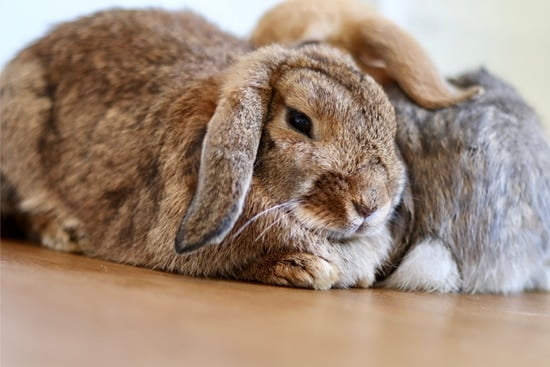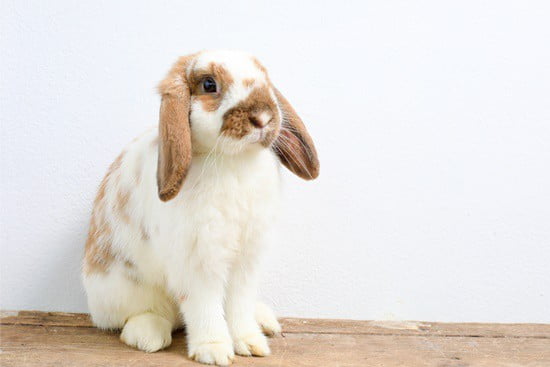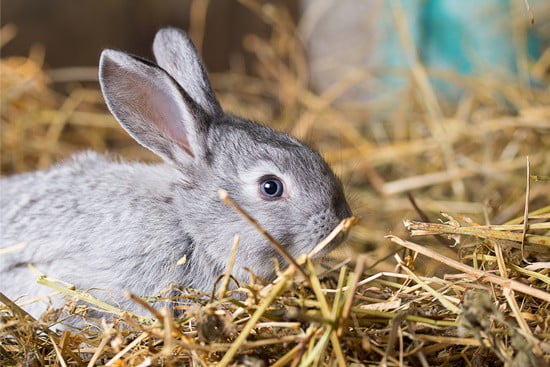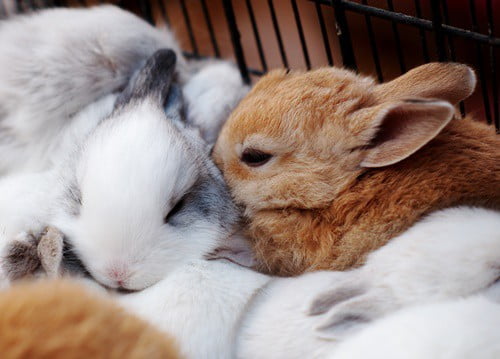If your rabbit is making strange noises when breathing, you’re bound to be concerned about her wellness. Wheezing is particularly worrying because it suggests your rabbit is struggling to breathe.
If your rabbit is wheezing, mouth breathing, or tilting the head, then she’s struggling to breathe. Also, nostril-flaring is a sign of breathlessness. Breathing problems are caused by bacterial infections, stress, nutrient deficiencies, allergies, and more.
Wheezing and mouth breathing are a cause for concern. But clucking and purring in rabbits are not. We’ll tell you what is and isn’t normal when it comes to rabbit breathing noises.
Why Is My Rabbit Making Strange Breathing Sounds?
If your rabbit is making strange breathing noises, then she may have a respiratory disease. Causes of respiratory disease in rabbits include:
- Bacterial, viral, fungal, or parasitic infections
- An injury or blockage to the respiratory system
- A suppressed immune system. This could be due to stress, a poor diet, steroids, etc.
- Allergens or irritants in the environment
- Cardiac disease
- Thyroid problems
A respiratory disease should always be investigated because it is often life-threatening. Don’t confuse labored breathing with the sounds of normal breathing.
How Do Rabbits Normally Breathe?
According to Physiology, the smaller the animal, the faster she’ll breathe. So, first-time rabbit owners might be surprised to find that rabbits breathe much faster than cats and dogs.
As long as your rabbit’s respiration rate is between 30 and 60 breaths per minute, then this is considered normal. A normal resting heart rate for a rabbit (beats per minute) is around 220.
Similar to human infants, rabbits breathe exclusively through their nose. Rabbits can breathe through their mouth when their nose is blocked. But they cannot tolerate mouth breathing for long, so it is considered a medical emergency.
If you sit quietly, you will probably be able to hear your rabbit’s breath. This is normal, as long as you don’t hear wheezing.
Signs of Abnormal Breathing in Rabbits
Now we know what normal breathing is, here are the signs of abnormal rabbit breathing:
- Very Slow Breathing – Less than 30 breaths per minute
- Tachypnoea or Rapid Breathing – More than 60 breaths per minute
- Flaring of the Nostrils – This suggests the rabbit is struggling to breathe through her nose
- A Bluish Tinge to Lips and Tongue – This suggests a lack of oxygen
- Nose Discharge and Runny Eyes – This is not always present with breathing difficulties
- Rabbit Making Wheezing Noises – Especially if it is continual
- Loud Snoring During Sleep – Not to be confused with light clucking during sleep, which is a sign of contentment
- Dyspnea or Gasping for Breath – Mouth breathing is severe in rabbits
- Head Tilting Upwards – Head tilt in rabbits is a life-threatening problem
All of the above symptoms indicate some form of respiratory disease. As mentioned, a respiratory disease has many different causes. The most common cause is an infection (bacterial, fungal, etc.)
Respiratory Infections
Respiratory infections are relatively common in rabbits. These infections can be caused by:
- Bacteria
- Viruses
- Fungi
- Parasites
Rabbit infections are serious and often lead to death if they are not treated. Wheezing and noisy breathing are common symptoms of an infection, but there are other symptoms, too.

Bacterial Infections
Bacterial infections are the most common type of infection in rabbits. According to Rabbit Welfare, bacterial infections are often caused by:
- Pasteurella Multocida
- Bordatella (Kennel cough)
- Pseudomonas
- Staphylococcus aureus
- Chlamydiosis
- Moraxella spp.
- Mycoplasmas – these bacteria do not have a cell wall around the cell membrane, so they’re difficult to treat with antibiotics.
Bacterial infections can be caught from a dirty rabbit hutch. Infections can also be caught from other animals, especially wild animals. If you have multiple pets in your household, wash your hands between handling each pet to prevent the spread of infection.
Symptoms of Bacterial Infections
As mentioned, rabbit infections tend to cause wheezing and noisy breathing. To be more specific, the symptoms of bacterial infections are:
- Discharge from the eyes and nose – Cloudy, milky, or smelly discharge is particularly concerning.
- Coughing, sneezing and wheezing – Hence the term “rabbit snuffles”
- A reduced appetite
- Lethargy
- Breathing through the mouth rather than the nose
- Flaring of the nostrils
- Slow breathing (under 30 breaths per minute) or tachypnoea (over 60 breaths per minute)
When rabbits have a bacterial infection, slow breathing is more common than tachypnoea.
Treatments for Bacterial Infections
Although rabbit snuffles might just look like a cold, they are much more serious than this. Bacterial infections should be diagnosed and treated as early as possible. Your vet will prescribe medication for your rabbit, and you will need to care for your rabbit at home until the infection has cleared up.
The most common treatment is antibiotics. It may be necessary to administer an antibacterial agent into your rabbit’s lungs using a nebulizer. Also, infections caused by mycoplasmas don’t usually respond to antibiotics, so additional drugs may be required. Once home, you’ll need to:
- Keep your rabbit’s home clean. The cage, litter tray, and toys must be disinfected regularly.
- Keep your rabbit warm (though not overheated). If you are moving your rabbit from outdoors to indoors, make sure the temperature is not drastically different.
- Wash your hands thoroughly after touching your rabbit.
- Keep other pets and children away from your rabbit during the recovery period.
Viral Infections (Myxomatosis)
Along with bacterial infections, viral infections can also cause breathing difficulties in rabbits.
According to NCBI, viral infections are not very common in rabbits, especially in the U.S. However, in Europe and Australia, rabbits are susceptible to a viral disease called myxomatosis.
This virus was introduced to these countries to help control feral rabbit populations. It causes death in around 95% of cases, so it certainly should be avoided. According to PDSA, symptoms of myxomatosis include:
- Breathing problems/congestion
- Lethargy
- Milky eyes
- Ulcers and scabs on the face
- Fever/the rabbit feels hot to touch
Breathing problems are often one of the first signs of myxomatosis.

Preventing Myxomatosis
In the UK, there is a myxomatosis vaccination for rabbits, so you should strongly consider this if your rabbit has not already received it. This vaccine isn’t available in Australia.
So, if you live in this country, you should take extra precautions to protect your rabbit. Rabbit owners in the U.S. may also take these precautions, but the risk of infection is much lower in the U.S.
So, how can you prevent myxomatosis? Well, this virus is usually spread through insect bites, so:
- If you live in an environment with mosquitos, cover your rabbit hutch with a mosquito net.
- Ask your vet about flea protection for your rabbit. If you have cats and dogs, make sure they are up to date with their flea treatments.
- Keep your rabbit clean. This will prevent flystrike.
Also, make sure your pet rabbit doesn’t have any contact with wild rabbits. Unfortunately, this viral infection has an extremely low survival rate, so prevention is key.
Fungal Infections
Fungal diseases in rabbits are rare, but they can sometimes arise. One such fungal disease which can affect breathing is Aspergillosis. This is an overgrowth of Aspergillus fungus – usually in the rabbit’s nasal passage.
Very young, old or chronically ill rabbits are most susceptible to this condition as they have a weaker immune system. Symptoms include:
- Gasping for breath
- Coughing and wheezing
- Lethargy
- Nasal discharge
- Flaring nostrils
The Aspergillus fungus grows on decaying vegetation so remove any uneaten veg from your rabbit’s cage at the end of each day.
Dermatophytosis is another fungal condition that can affect rabbits. If one of the fungal skin lesions develops in the nose, this can cause breathing difficulties. But dermatophytosis on other parts of the body does not usually cause breathing problems.
Blockages
If your rabbit is coughing, spluttering of gasping for air, this may be caused by a blockage. Items that can cause obstructions include:
- Hay stalks
- Brussel sprout stalks
- Raisins
- Grass seeds
- Peanuts or other small nuts
Another symptom of a blockage is nasal discharge (coming from both nostrils). Blockages should be investigated by a vet immediately.
Stress
Stress can alter a rabbit’s breathing. And if the stress is chronic, this can cause severe breathing difficulties. Here are some symptoms of stress-related breathing problems in rabbits:
- Tachypnoea or panting (more than 60 breaths per minute)
- Agitated grunts (regular)
- High-pitched screeches
- Self-soothing repetitive behavior – For example, excessive licking or biting
- Curling up in a ball for long periods
- Gnawing at themselves (extreme stress)
Prolonged periods of stress can also cause respiratory infections. This is because the stress weakens the rabbit’s immune system, and this leaves them susceptible to pathogens.
What Causes Stress in Rabbits?
Rabbits are extremely sensitive creatures, so seemingly minor things can cause intense stress. To give you an idea, the following can cause stress and anxiety in rabbits:
- Drastic changes in temperature, environment, or diet
- A dirty cage or litter pan
- A cage that is too small
- A cage that is positioned in a draught
- Not enough food or the wrong sorts of food
- Feeling threatened by local predators such as dogs and foxes. Or, feeling threatened by other pets in the household.
- Living with a very dominant rabbit
- Health problems, especially dental problems
- Lack of stimulation or spending too long in their cage
- Or, being handled too often
These things can lead to stress and breathing difficulties.

How to Prevent Stress in Rabbits
Most of us assume that because we love and care for our bunny, they must be free from stress. But this is not always the case. Even if you put a lot of effort into caring for your rabbit, there may be some room for improvement.
To be calm and contented, rabbits must have the following:
- Food and Water – Check you are feeding your rabbit a species-appropriate diet. And does your bunny have fresh water available at all times?
- Housing – Is the cage/hutch big enough? Do you clean it regularly? And is it the right temperature for rabbits?
- Socialization and Play – Does your rabbit get some exercise every day?
- Protection from Others – Are you protecting your rabbit from other pets in the household? And predators in your local area? Are you doing everything you can to minimize these interactions?
- Physical Health – Does your rabbit see a vet for regular checkups? Ideally, try and find a vet that specializes in exotic pets.
If you notice any room for improvement, make the adjustments gradually. Rabbits cannot adapt to a sudden change in environment or a sudden change in diet, so take baby steps.
Allergies and Irritants
Allergies or irritants can also cause breathing problems in rabbits. Allergies are quite rare in rabbits, especially compared to cats and dogs. But there are lots of potential irritants. These include:
- Cigarette smoke and smoke from a fire.
- Ammonia (a substance in rabbit pee). This is why it’s important to keep your rabbit’s cage clean.
- Air fresheners.
- Carpet cleaning products,
- Dust – Sometimes, it’s assumed that a rabbit is allergic to a type of hay, but they might just be sensitive to the dust within that hay. A high-quality, dust-free version may not cause any problems.
Allergens and irritants can cause coughing, sneezing, lethargy, rapid or slow breathing, and runny eyes and nose.
Cardiac Disease
These days, cardiac disease is fairly common in pet rabbits. This could be because we are getting better at diagnosing this condition. Or, it could be because pet rabbits are living longer lives.
You might expect breathing problems to be the first sign of cardiac disease, but this is often not the case. In fact, cardiac disease is often misdiagnosed because breathing problems come much later. According to Mag Online, the first symptoms of cardiac disease include:
- Lethargy
- Weight loss
- Poor appetite
- Abdominal distension
- Collapsing
In some cases, there might be rapid or open-mouth breathing, but this is not always the case.
Causes of Cardiac Disease in Rabbits
At this time, we do not fully understand the causes of cardiac disease. Specialists believe that the following factors may be involved:
- Old age
- Damage to the heart due to infection
- Nutrient deficiencies – Such as too much vitamin D, and/or calcium, and too little phosphorus
So, feeding your rabbit the correct diet, and keeping the cage clean may help to prevent cardiac disease. In any case, it will undoubtedly help to keep your rabbit healthy.
Is Snoring Normal in Rabbits?
Rabbits sometimes make noises during sleep. A light clucking sound is considered normal, but loud snoring is more worrying.
Snoring can be a symptom of any of the conditions we’ve mentioned so far, such as infections, stress, and allergies. Tumors, hypothyroidism, and abscesses can also trigger snoring.
Also, it’s thought that some rabbits suffer from obstructive sleep apnea (OSA). A rabbit with OSA will actually stop breathing at points during the night, so it’s a severe condition.
So, rabbit snoring should always be investigated. It might not turn about to be anything serious, but it’s better to be on the safe side.
Normal Noises Rabbits Make
Although strange noises can be a cause for concern, it’s important to say that some rabbit noises are normal. Rabbits don’t meow or woof, but they do communicate through sound.
In fact, it is these subtle sounds which make rabbits so endearing. With that said, the following rabbit noises are probably not a cause for concern:
- Grunting or Muttering (Occasional) – Rabbit’s occasionally grunt when they want to be left alone. If your rabbit grunts occasionally (in an appropriate context) this is completely normal.
- Honking (Occasional) – Honking is another sign of annoyance. If your rabbit honks when touched, they probably just want to be left alone.
- Clucking– As mentioned, light clucking is usually a sign of deep contentment.
- Purring – Rabbits use their teeth to purr. This purr is very quiet, so you’ll need to listen carefully. It is not to be confused with teeth grinding, which is very serious.
- Breathing in and Out – As mentioned, it’s normal to hear your rabbit breathing, as long as you don’t hear any wheezing or labored breathing. You can count your rabbit’s breaths per minute if you are concerned.
In some cases, you’ll need to use the context of the situation to understand your rabbit’s noises. Grunting is understandable if there is something to grunt about. But continual grunting for no apparent reason indicates respiratory disease.
Respiratory disease is very serious in rabbits, so get it checked out. Many different factors can cause it, so you’ll need the help of a vet for an accurate diagnosis.


Hi I have a rabbit named gig and she a a problem with her breathing I mostly hear it when she lay down she also had this other problem with her head and it would always go on the side by itself I think it was called head tilt so me and my mum brought her to the vet and they gave us this treatment that worked and her head is all good knowing I am not sure if I should use that treatment or not I want to bring her to the vet but don’t want my mum to spend 500 for treatment and also wanted to mention that her poop smells really bad and I don’t think that normal because I have other rabbits and their poop doesn’t smell as bad I was hoping that you could help please